-
 Art of Wellness Acupuncture & Traditional Chinese Medicine (TCM)11704 Wilshire Blvd, Suite 295, Los Angeles, CA, 90025
Art of Wellness Acupuncture & Traditional Chinese Medicine (TCM)11704 Wilshire Blvd, Suite 295, Los Angeles, CA, 90025
myartofwellness@gmail.com310-451-5522 Office Hours
MonClosedTue7:30 am --4 pmWed7:30 am --4 pmThu7:30 am -- 4 pmFri7:30 am -- 4 pmSat7:30 am -- 4 pmSunClosedOur office opens from Tuesdays to Saturdays 7:30 am to 4 pm, will be closed on Memorial day, Independent day, Labor day, Thanksgiving day, Christmas and New year.
-
Recent Posts
- Acupuncture and TCM Treatment for Perimenopause Symptoms
- How to Treat Insulin Resistance With Acupuncture and TCM
- How to Treat Metabolic Syndrome With Acupuncture and TCM
- How to Treat Syncope With Acupuncture and TCM
- How to Treat Thoracic Outlet Syndrome With Acupuncture and TCM
- How to Treat Dupuytren’s Contracture With Acupuncture and TCM
- How to Treat Nutcracker Syndrome With Acupuncture and TCM
- How to Treat Rosacea With Acupuncture and TCM
- How to Treat Perioral Dermatitis With Acupuncture and TCM
- Lymphatic Drainage With Acupuncture and TCM
- How to Treat Turf Toe With Acupuncture
- How to Treat Nerve Pain With Acupuncture and TCM
- How to Treat Watery Eyes With Acupuncture and TCM
- How to Treat Ovarian Cysts With Acupuncture and TCM
- How to Treat Dystonia With Acupuncture and TCM
- Can Acupuncture Help Bad Breath?
- Sign up to receive news and updates and get my free report:“The Top 10 Reasons to Try Acupuncture”

November 2025 M T W T F S S 1 2 3 4 5 6 7 8 9 10 11 12 13 14 15 16 17 18 19 20 21 22 23 24 25 26 27 28 29 30
Immune System
How to Treat Pneumonia Symptoms With Acupuncture and TCM
By Xiaomei Cai, L.Ac., Ph.D. & Qineng Tan, L.Ac., Ph.D.
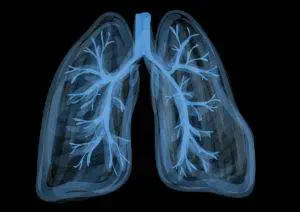
Persistent cough with green or yellow mucus? Chest pain when you cough? High fever, sweating, trouble breathing? It’s important to know the signs of pneumonia, a serious lung infection that can be caused by bacterial infections or viruses like the flu, COVID-19, or even the common cold. You should seek medical help if you believe you have pneumonia; acupuncture and herbs can be considered as integrative care to help relieve symptoms of pneumonia.
The term pneumonia refers to an infection in the lungs that causes inflammation in the alveoli, or air sacs. These air sacs are clustered like fruits around the ends of the branches of the bronchial tubes that extend deep into the lungs. The alveoli inflate and deflate like tiny balloons. They are responsible for taking the oxygen from the air you inhale and depositing it into the bloodstream. When they become inflamed and filled with fluid due to infection, it is hard to breathe. If pneumonia infection is so severe that your body is not getting enough oxygen, then it can become quite dangerous.
Pneumonia can be caused by a variety of infectious bacteria or viruses, and often develops after, or in the tail end, of some other type of illness. A pneumonia infection can range in seriousness from mild to very severe. Bacterial pneumonia requires treatment, especially for people who are considered high risk, or it can be potentially life-threatening. Acupuncture and TCM offer an effective adjunct to conventional pneumonia treatment, allowing people to recover more quickly and fully.
Early Signs of Pneumonia
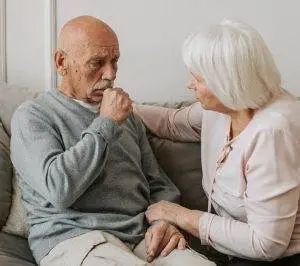
In many cases, you start out having a cold, flu, or some other illness, and then it “turns into” pneumonia, as your lungs become inflamed and filled with pus or mucus. Symptoms of pneumonia include:
- Cough with green or yellow mucus
- High fever
- Sweating
- Trouble breathing, breathing fast
- Fatigue
- Fast heart beat
- Chest pain, especially when coughing
- Feeling confused or delirious
- Lips and/or nails turn blue
- Loss of appetite
Signs of pneumonia in children may be different that symptoms of pneumonia in adults. There may be coughing, wheezing and high fever, but there may also be vomiting and/or diarrhea, especially if the infection is in the lower part of the lungs. Children are at risk for becoming dehydrated under these circumstances.
Walking pneumonia symptoms are generally milder than other types of pneumonia, similar to symptoms of the common cold, like a low grade fever and hacking cough. A person may not feel so seriously ill that they can’t go about normal activities: hence the name “walking pneumonia.”
Pneumonia can affect just one one lung, or both. When both lungs are infected, it is called bilateral pneumonia, or double pneumonia. This does not necessarily mean the case is more severe.
Is Pneumonia Contagious?
Some types of pneumonia are caused by exposure to bacteria or viral particles in the air or on surfaces. Germs that cause colds and flu can lead to some people developing pneumonia, while other people could be exposed to those same germs and not get pneumonia. It really depends on a person’s constitutional health and immune system.
Other kinds, like fungal pneumonia or aspiration pneumonia, are not caught through contagion. They develop because of some substance, other than germs, getting into the lungs.
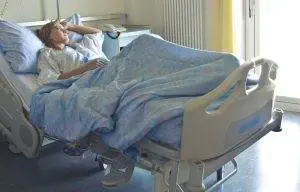
Some types of bacterial pneumonia would not be passed from person to person in normal day-to-day contact, but they may occur when a person is in a weakened state and/or an institutional setting. For example, klebsiella pneumoniae is a type of bacteria that normally lives in the intestines and doesn’t cause illness. However, in a hospital, it is possible to be exposed to this type of bacteria via a worker’s hands or contaminated equipment, such as a catheter or ventilator. If this bacteria then reaches the lungs, it can cause pneumonia symptoms.
Many people “catch” pneumonia when they are in a hospital or rehab setting. Sometimes, people develop pneumonia after being on a ventilator as treatment for some other illness or while recovering from surgery. When this happens, it is called hospital-acquired pneumonia, or health care-acquired pneumonia.
Top 5 Pneumonia Causes
Pneumonia can be caused by various types of infections: bacterial, viral, or fungal.
- Bacterial Pneumonia – also called pneumococcal pneumonia, or streptococcus pneumonia, this is the most common type of pneumonia, and is caused by strep germs that cause upper respiratory illnesses. Almost a million Americans get this kind of pneumonia every year. It can happen at the tail-end of a cold or flu, or after having surgery or being hospitalized for some other reason. People with respiratory problems like asthma or emphysema are at higher risk, as are people who are immunocompromised.
- Viral Pneumonia – this is caused by an influenza virus or respiratory syncytial virus (RSV). This is the type that children may get more often. If a person who already has heart disease or lung disease, or someone who is pregnant, develops pneumonia after a flu, it can be very dangerous.
- Mycoplasma Pneumoniae (Walking Pneumonia) – this type of pneumonia is caused by a bacterial strain. This usually affects younger people who are living, working, or going to school, and is often mild enough that people think they just have a cold. This is sometimes called “atypical pneumonia,” but that doesn’t mean it isn’t common.
- Fungal Pneumonia – it is possible to get this kind of pneumonia if you are exposed to certain fungi in the environment, like those that live in soil and cause “valley fever,” or fungi that are found in bird droppings.
- Legionnaires Disease – legionella is a bacteria that can live in water or soil, and is sometimes present in plumbing, air conditioning systems, pools, or jacuzzis. People can sometimes breathe it in while gardening. If an at-risk individual breathes in this bacteria, they may develop a kind of pneumonia that also causes body aches. In some cases, people may go into septic shock or kidney failure.
People who have weakened immunity due to conditions like HIV/AIDS, or because they are going through chemotherapy for cancer, are at heightened risk for developing pneumonia, as are people who have trouble swallowing due to neurological conditions like stroke, Alzheimer’s disease/dementia, Parkinson’s disease, or ALS.
Smoking or using other drugs can also increase the risk of aspiration pneumonia, which can occur if a person breathes something–such as saliva, vomit, or food particles–into their bronchial tubes instead of swallowing it.
People with pre-existing lung conditions like emphysema/COPD or Cystic Fibrosis (CF), or other chronic illnesses, like diabetes, are also at higher risk for getting a serious case of pneumonia.
Medical Pneumonia Treatment
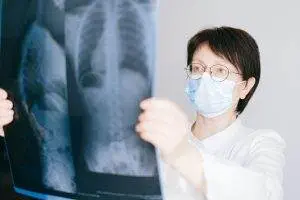
It is important to seek treatment if you believe you have pneumonia, because it can become very serious very quickly. First, doctors will do testing to determine what is causing the pneumonia. They will probably perform an x-ray to see where the lungs are inflamed.
Bacterial forms of pneumonia are typically treated with antibiotics, usually some form of amoxicillin. Pneumonia antibiotics cannot help if you have viral pneumonia, although some doctors may recommend medicines like Tamiflu, to help with symptoms.
Recovering from pneumonia takes time, no matter what kind of medication you take. It is normal to feel very tired, possibly for up to a month, or more. Rest, and drink lots of liquids, reduce your workload, and accept help whenever possible.
Acupuncture treatment and Chinese herb preparations can be very helpful for helping facilitate a more comfortable recovery from pneumonia.
Can Acupuncture Help Pneumonia?
According to TCM theory of disease, pneumonia is considered an invasion of the lungs by dampness and heat that leads to the production of phlegm. Wind and heat cause the fever and chills and sweating associated with the pneumonia.
TCM treatment for pneumonia can help on multiple levels: first, by addressing the infection in the lungs, second, by alleviating respiratory and gastrointestinal symptoms, and third, by helping to offset any negative side effects of conventional medical treatments.
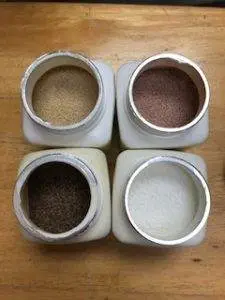
Chinese herbal formulations can help to clear heat and congestion from the lungs, reduce fever, and relieve coughing. One study observed two groups of pneumonia patients: both groups were given conventional antibiotics, but one group also received acupuncture herbs, which increased the total effectiveness rate by 10%.
Acupuncture was found to help patients who were hospitalized with severe pneumonia, reducing the amount of time they needed to be on ventilator machines and improving their symptoms.
Another study of children being treated in the hospital for pneumonia found that those who had acupuncture treatment had shorter hospital stays and needed less medication.
TCM works effectively as preventive medicine, so coming in for a regular “acupuncture tune-up” can help you avoid the seasonal colds and flus that can turn into pneumonia. It can also help immunocompromised people and those at higher risk of aspiration pneumonia due to neurological conditions avoid becoming ill.
Acupuncture Near Me for Pneumonia
If you are experiencing fever, chest pain when coughing, extreme fatigue, sweating, and/or looking blue around the lips, do not hesitate to get medical attention. Pneumonia requires urgent care. Once diagnostics have determined whether you have bacterial pneumonia or some other type, then it can be beneficial for you to add integrative care in the form of acupuncture and herbs to your recovery program. TCM methods can help clear phlegm from your lungs and help you regain your strength.
*This article is for education from the perspective of Traditional Chinese Medicine only. The education provided by this article is not approved by FDA to diagnose, prevent, treat and cure human diseases. It should not stop you from consulting with your physician for your medical conditions. Traditional Chinese Medicine is based on Qi, which is an invisible force that usually cannot be observed by modern science. Because science focuses on testing ideas about the natural world with evidence obtained through observation, these aspects of acupuncture can’t be studied by science. Therefore acupuncture and Chinese herbs are often not supported by double-blind, randomized trials, and they are considered alternative medicine therapies in the United States.
How to Treat the Common Cold With Acupuncture and TCM
By Qineng Tan, L.Ac., Ph.D & Xiaomei Cai, L.Ac., Ph.D.
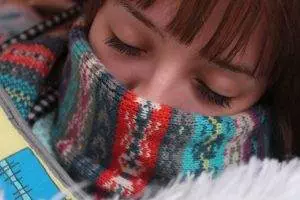
Sneezing, runny nose, nasal congestion, cough? How can you tell if it’s a cold symptom, a flu, COVID-19, mononucleosis, croup, or maybe an allergy? All of these illnesses can cause fatigue and a stuffy nose. The common cold, however, does not cause a high fever, and the cough is usually mild, not a persistent cough. Acupuncture and TCM herbs offer a highly effective way to relieve common cold symptoms.
A cold is a kind of viral infection that affects your upper respiratory tract, centering mostly in the nose and throat. Different viruses can cause the common cold; rhinovirus is the most common kind of cold virus.
You can catch a cold virus when you are near someone else who sneezes or coughs, and you get droplets containing the virus into your own nose, mouth, or eyes, or you touch something they coughed or sneezed on, and then touch your own face.
Young children and people with weakened immune systems are more prone to catching colds, as are people who smoke. You’re more likely to catch a cold if you spend a lot of time in crowded places, like schools, airports, public transportation, etc. More people get colds during the winter, because more people are packed together indoors, but cold-causing viruses are circulating all through the year.
You will start feeling cold symptoms within a few days of being exposed to the virus. Typically, without any medical intervention, a cold will last about a week or ten days. For some people, though, a cold can lead to other, more serious infections, like an ear infection, asthma and wheezing, sinusitis/sinus infection, bronchitis, or even pneumonia.
Cold symptoms aren’t so much caused by the virus, but by the workings of the body’s own immune system to expel the virus. Coughing and a runny nose are the body’s way of getting the virus out of the respiratory system. While the common cold doesn’t necessarily require any medical treatment, it is best to take steps to strengthen your immune system and clear the virus as soon as you can.
Chinese herbs and acupuncture treatment are an excellent way to shorten the duration and lessen the severity of a cold. Regular acupuncture treatment also functions as preventive medicine, so that you and your family don’t catch cold nearly as often.
Top 10 Common Cold Symptoms
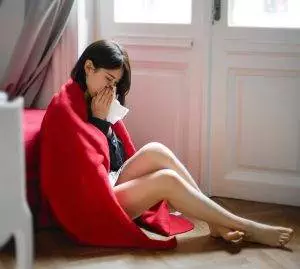
How can you tell if you have a cold or a flu? Usually, cold symptoms are more centered in the nose and throat, and are milder than flu symptoms. A flu is more likely to cause serious fatigue, chills and fever, and body aches than a cold is.
The typical symptoms of common cold include:
- Runny nose, stuffy nose, nasal congestion
- Sneezing
- Sore throat
- Cough
- Post-nasal drip
- Watery eyes
- Headache
- Body aches
- Low grade fever
- Fatigue, feeling tired
Sometimes people differentiate between head cold symptoms and a chest cold. A head cold describes the way most rhinovirus colds manifest in the upper respiratory organs: with a stuffed up nose, sniffling, headaches, and a red, sore throat.
If the cold “moves” down into the chest, causing inflamed bronchial tubes, and mucus production in the lungs, this is called acute bronchitis. This feels more like chest congestion, with a more persistent cough. Once a cold turns into bronchitis, you are more likely to have a serious cough, with or without coughing up phlegm.
How Is the Common Cold Usually Treated?
The accepted wisdom is that there is no cure for a cold; you just have to do whatever you can to make yourself more comfortable while the illness runs its course. Antibiotics only help get rid of bacterial infections. They do not help when you have a viral infection.
While it is true that there is no medication you can take to get rid of a cold, there are many remedies, both traditional home remedies for cough, and popular over-the-counter medicines and health store supplements that claim to take care of your cold symptoms.

Many people swear by things like Vitamin C, Zinc lozenges, or echinacea preparations. Other people will tell you to drink hot honey water and eat chicken soup. All of these natural cold remedies may have some benefits. At least, they don’t do any harm.
Other cold medicines may do more harm than good. Cough suppressants and nasal decongestants actually work against your body’s natural defenses. Your body is producing mucus and the cough reflex in order to expel the virus and keep it out of your lungs. Repressing these natural immune responses can prolong your cold.
Nasal decongestants like Sudafed can cause a fast heart rate and jittery feelings, especially in young children. Cough syrup with antitussive properties, or cough suppressant, can have negative side effects besides just making you drowsy or irritable. Some cough medicines can interact with other medications, making them inappropriate for people who have problems like high blood pressure, enlarged prostate (BPH), or glaucoma.
Trying to power on through your days with the help of OTC cold relief medications, caffeinated drinks, and sugary cough drops, without getting the rest you need, is not a good idea. Getting extra rest and drinking plenty of fluids are definitely tried and true ways to get over your cold.
Consider that acupuncture and herbal medicine developed over centuries of TCM tradition can help address cold symptoms without any side effects, and may help you recover more quickly than rest alone.
TCM for Colds: How to Get Rid of a Cold Fast

In TCM we consider some conditions to be external, meaning that they come from outside the body, in the form of pathogenic factors like heat, cold, wind, and dampness. Based on the environment, and the types of symptoms, we determine whether a cold follows a pattern of a cold-wind type, or a heat-wind type, or sometimes a hot-damp type as might occur during the summertime. An acupuncture practitioner will then base the treatment on the pattern of cold presented.
Acupuncture treatment influences the immune system’s response, and since that is what is actually causing the symptoms of a cold, the use of acupuncture points for cold and sore throat can really have a positive effect on reducing cold symptoms.
Cupping is a TCM modality that may be used to help treat colds and other respiratory conditions. Cupping helps to relieve congestion and gets lymph and blood circulation moving.
When you come in with a cold, your TCM provider will tailor your acupuncture treatment and prepare an herb formula specific to your needs. That said, our patients who have been coming into Art of Wellness for many years know that there is a
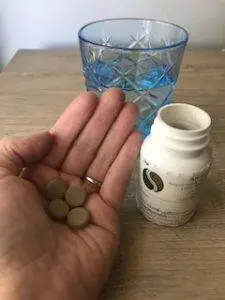
standard formula that is excellent for “knocking out” a cold if you can catch it at the very beginning. Right when you begin to feel that tickle in the back of your throat, that is the time to reach for your supply of Yin Chiao pills!
Ginger tea, made by simply slicing a bit of fresh ginger and steeping it in hot water, is also a great way to stop a cold in its tracks, before it gets worse.
Acupuncture Near Me for Common Cold in Santa Monica, West LA
Making time for regular acupuncture “tune-up” visits can help keep your body and mind balanced and your immune system in good working order. In the ancient TCM tradition, acupuncturists used to treat their patients for free when they caught a cold type illness, because it meant they hadn’t done their job of boosting immunity well enough. Prevention is certainly the best medicine when it comes to colds and flus. When you do begin to feel the first signs of a cold, though, it isn’t too late. Come in for a treatment, or call us at Art of Wellness to order some herbs to be shipped to you. We can help you get over your cold symptoms quickly.
*This article is for education from the perspective of Traditional Chinese Medicine only. The education provided by this article is not approved by FDA to diagnose, prevent, treat and cure human diseases. It should not stop you from consulting with your physician for your medical conditions. Traditional Chinese Medicine is based on Qi, which is an invisible force that usually cannot be observed by modern science. Because science focuses on testing ideas about the natural world with evidence obtained through observation, these aspects of acupuncture can’t be studied by science. Therefore acupuncture and Chinese herbs are often not supported by double-blind, randomized trials, and they are considered alternative medicine therapies in the United States.
How to Treat Rheumatoid Arthritis (RA) With Acupuncture and TCM
By Qineng Tan, L.Ac., Ph.D. & Xiaomei Cai, L.Ac., Ph.D.

Do you have joint pain, swelling or stiffness in the joints, especially finger joint pain or a swollen knee? Maybe you feel that the joint pain is moving to other parts of your body, or flares up sometimes, and then seems to go away. Joint pain accompanied by fever and fatigue may be a sign of Rheumatoid Arthritis (RA), an auto immune disease that causes inflammation and can lead to serious physical disability. Acupuncture and TCM offer a way to help people who suffer from Rheumatoid arthritis, as well as other types of arthritis and autoimmune disorders.
Arthritis is a general term that refers to all kinds of joint pain. Most types of arthritis begin to occur due to aging and the repeated “wear and tear” on the joints of the body that happens as we move through life. Any place in the body where two bones meet is considered a joint, so arthritis pain and inflammation can occur in the large joints of the limbs, causing shoulder pain or hip pain, in the spine, causing back pain, or in the extremities: arthritis in hands and feet. Rheumatoid arthritis most commonly shows up first as arthritis in fingers, hands, and knees.
RA can also be considered a connective tissue disorder, and, as such, bears similarities to Lupus and Ehlers-Danlos Syndrome (EDS).
Rheumatoid arthritis used to be commonly known as “rheumatism,” and now may be referred to as “RA.” It is different from other types of arthritis because the joint pain is caused by immune system problems, not injury or overuse of the joint.
When a person develops an autoimmune disorder, their immune system is mistakenly attacking normal tissues in the body. In the case of RA, an immune response attacks the lining of the joints, a soft tissue membrane called synovium. This creates inflammation and can ultimately begin to cause damage to the bones themselves (osteoporosis). Affected parts of the body can begin to change shape, become weak, and eventually lose their ability to function properly.
In later stages of RA, other body systems can be affected, as well. The joint lining contains blood vessels and nerves, so damage to the synovium can also impact the cardiovascular system and the nervous system. People with RA are at greater risk for developing nerve damage, heart disease, lung disease, and problems with the eyes. People with Rheumatoid arthritis can also be more prone to getting infections like the flu or pneumonia, and certain types of cancers, like lymphoma.
RA can affect your body composition, leading to obesity. Some people may lose weight initially, but it is usually muscle mass that is lost, as RA makes exercise difficult. This means that people can end up with an unhealthy ratio of fat to muscle.
RA is different from osteoarthritis in that it can show up at any time in life. Sometime children develop Juvenile Rheumatoid Arthritis (also known as Juvenile Idiopathic Arthritis). Like RA in adults, this is an autoimmune disorder, and can cause other symptoms like fever and rashes. Some children will grow out of their RA symptoms; others may carry this disorder with them into adulthood.
Most people with RA begin to show signs in their middle age. Women are more likely to have RA than men. As with other autoimmune diseases, medical science has not determined the exact Rheumatoid arthritis causes, but they may be partly genetic, and partly having to do with hormones. Environmental factors may contribute to RA, as can stress and strong emotions. Past illnesses or viral infections, like Epstein Barr virus, can also be a factor.
TCM and acupuncture treatment for Rheumatoid arthritis works on multiple levels. Acupuncture can help to reduce inflammation and stiffness in the joints. TCM treatment with herbs helps to improve and balance immune function. Acupuncture can also relieve emotional symptoms related to stress, fatigue, and depression.
Top 10 Rheumatoid Arthritis Symptoms
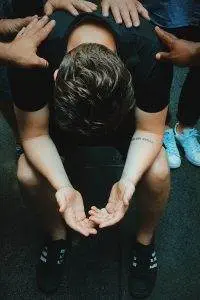
For some people the symptoms of Rheumatoid Arthritis may develop slowly over many years; for others, they may start suddenly. People will experience RA symptoms as different sensations, in different parts of the body, which is part of what makes it difficult to diagnose. The most common symptoms of RA include:
- Joint pain that starts in the smaller joints: pain in hands, pain in knees, pain in toes
- Redness and swelling in joints: swollen fingers, swollen knee, hands swollen, ankle swollen
- A sensation of heat or warmth in the joints
- Stiffness first thing in the morning that gets better as the day goes on
- Fatigue, feeling exhausted, tired all the time
- Pain in same joint on both sides, for example, pain in both knees
- Hard lumps under the skin near the painful joints (Rheumatoid nodules)
- Eye pain, dry eyes, blurry vision
- Low grade fever
- Depression, feelings of frustration or hopelessness
People with RA that affects their hips, knees, or ankles may begin to walk with a limp. Diminished function of the joints may cause a person to lose their grip strength and coordination. Over time, the hands and fingers or feet and toes may begin to become disfigured, as loss of soft tissue and bone changes their shape.
People with Rheumatoid arthritis are also more likely to experience Raynaud’s syndrome, a condition that constricts blood vessels in the fingers and/or toes when exposed to cold, causing numbness and a whitening of the skin as blood circulation slows.
In some cases, RA can also cause an enlarged spleen.
Rheumatoid Arthritis Treatment
At this time, treatments for rheumatoid arthritis are mainly directed towards relieving pain, reducing chronic inflammation, and slowing down the progression of this inflammatory disease.
A primary care physician will probably refer patients to a rheumatologist for rheumatoid arthritis diagnosis and treatment. Rheumatologists specialize in joint diseases and all types of arthritis, so they treat joint pain related to conditions like osteoarthritis, psoriatic arthritis, reactive arthritis, musculoskeletal pain related to fibromyalgia, tendonitis, and autoimmune diseases like lupus.
Typical medical options for RA include NSAIDs and corticosteroids, to quickly reduce pain inflammation. Anti-rheumatic drugs, known as DMARDS, have both anti-inflammatory and immunosuppressive properties. They work more slowly, but if started soon after diagnosis, they can help to prevent more damage to joint tissues, and relieve RA symptoms.
Unfortunately, all of these medications carry side effects. In the case of DMARDS, some patients experience gastric upset, headaches, and fatigue. They can also increase chances of infections, which is already a problem for people with RA.
Biologics are another type of injectable medication used to help relieve chronic inflammation by suppressing certain immune responses. These can also put people at higher risk for infections and certain cancers.
Acupuncture and TCM offer a way to reduce inflammation and pain without side effects.
Can Acupuncture Help Rheumatoid Arthritis?
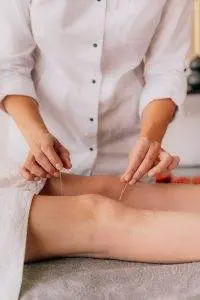
TCM has its own way of categorizing diseases. According to TCM theory, Rheumatoid arthritis falls under the category of “Bi” disorders. In TCM, environmental factors like cold, wind, heat, and dampness can invade the body and affect the organs, ultimately causing organ systems to malfunction. When they manifest in the body, pathogenic factors like cold and dampness can slow down or block the flow of blood and Qi (life force energy) through the body.
“Bi” conditions involve obstructions of Qi and blood that then lead to stiffness, swelling, soreness, redness, and heat in the joints. The famous TCM medical text known as “The Yellow Emperor’s Classic of Internal Medicine,” which was written a few centuries B.C., recorded identification of Bi syndromes. Bi syndromes can certainly be in part related to outside environmental conditions, such as living in a cold, wet, windy place. They can also be related to a weakness of protective Qi that would translate into conventional terms as being a weakened immune system. Thus, Bi syndromes include rheumatoid arthritis, other types of arthritis, and other painful joint conditions like gout, lupus, and neuralgia.
A review of studies conducted on patients who received acupuncture treatment for Rheumatoid arthritis concluded that TCM is a good method for helping patients with this type of condition. TCM acknowledges that within one disease, different people may have very different symptoms, due to their genetics, or what we sometimes call “constitution.” One person will show hot symptoms like redness, swelling, and fever. Another person may find that their joint pain is particularly affected by cold, wet weather. An acupuncturist near me will look and listen to see what sort of pattern has developed, and will treat each individual accordingly with acupuncture points for joint pain.
Acupuncture Near Me for Rheumatoid Arthritis in Greater Los Angeles
TCM offers a framework in which we are able to see autoimmune disease as a collection of issues that can all be addressed in concert. With acupuncture and herbs, we can help relieve pain and inflammation, while also building back up of the systems of the body that have become weak. At Art of Wellness in West LA, we have many years of experience helping people manage autoimmune disorders and get relief from joint pain.
*This article is for education from the perspective of Traditional Chinese Medicine only. The education provided by this article is not approved by FDA to diagnose, prevent, treat and cure human diseases. It should not stop you from consulting with your physician for your medical conditions. Traditional Chinese Medicine is based on Qi, which is an invisible force that usually cannot be observed by modern science. Because science focuses on testing ideas about the natural world with evidence obtained through observation, these aspects of acupuncture can’t be studied by science. Therefore acupuncture and Chinese herbs are often not supported by double-blind, randomized trials, and they are considered alternative medicine therapies in the United States.
How to Treat Celiac Disease With Acupuncture and TCM
By Qineng Tan, L.Ac., Ph.D. & Xiaomei Cai, L.Ac., Ph.D.
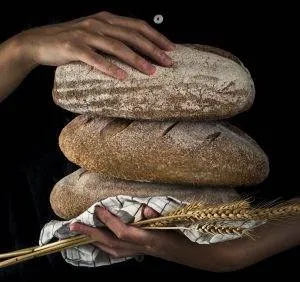
Do you have digestive problems like a bloated stomach, diarrhea, and abdominal pain? Unintentional weight loss, fatigue, skin rashes? These can all be signs of Celiac disease. Different from food allergies, Celiac is a serious autoimmune disorder that can lead to malnutrition and other debilitating health problems. TCM herbs and acupuncture treatment offer a good alternative way of managing Celiac disease and gluten intolerance symptoms.
In recent years, you have probably heard a lot of people saying they are switching to a gluten free diet because they have a gluten allergy or gluten intolerance. Sometimes people may just be trying to see if they feel better when they cut out wheat products, or they are going on a low carb diet to help them lose weight. Other people may be experiencing symptoms like diarrhea and nausea and hope that going on an IBS diet will help.
What is gluten? Gluten is a protein that is present in some grains, including wheat, barley, and rye. When a person has Celiac disease, gluten is perceived by the immune system as a dangerous foreign substance, triggering an immune response. Antibodies (white blood cells) are produced as a reaction to gluten entering the body, and the antibodies end up causing inflammation and damage to the inside of the intestinal tract.
This damage to the small intestine is called villous atrophy, and this is what causes inflammation and malabsorption of nutrients, leading to the myriad symptoms of Celiac. Celiac symptoms vary widely, and can include both digestive problems, and other conditions, like anemia, that stem from the lack of proper nourishment to the body.
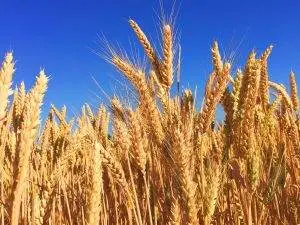
There is such a thing as a true wheat allergy, which for some people causes respiratory problems like difficulty breathing and nasal congestion, and other allergy symptoms like swelling and itching around the mouth and throat, hives or other itchy skin rashes, and headaches. Wheat allergies are a response to chemical compounds in wheat, which is found in a wide variety of food products. In some cases, exposure to wheat can cause anaphylaxis, which requires emergency medical attention because it can involve trouble breathing and swallowing, chest tightening, throat swelling, dizziness, and fainting.
Some doctors now recognize gluten intolerance or non-celiac gluten sensitivity as a separate condition from Celiac disease. For some people, gluten causes an immune response and symptoms, but not the same kind of damage to the intestines that Celiac does. If gluten intolerance is suspected, then following a gluten free diet for a period of time and noticing if symptoms clear up is usually the recommended course of action.
Celiac disease tends to run in families, and so is considered to be passed genetically. People can begin to show signs of Celiac at any age. It is estimated that at least 1% of the population has Celiac disease, but that number may be significantly higher, as it is still not a very well understood condition. Many people who have Celiac disease are unaware of it, or have been misdiagnosed with other conditions. Researchers believe that the incidence of Celiac disease is increasing worldwide, probably due to some environmental factors.
Acupuncture and TCM herbs provide a holistic way to treat Celiac disease, relieving the painful symptoms and providing detailed guidance for lifestyle and dietary changes that can help people manage Celiac and gluten intolerance. Nutrition is considered to be one of the primary branches of TCM, along with acupuncture and herbs. A TCM practitioner will be able to give you dietary recommendations far beyond just telling you to eat gluten free foods.
Top 10 Celiac Disease Symptoms
People can experience a variety of gluten intolerance symptoms, including digestive problems, allergy symptoms like skin rash, and other symptoms related to nutritional deficiency, like anemia and weight loss. Signs of gluten intolerance may be different in children, who are more susceptible to malnourishment that can lead to a failure to thrive.
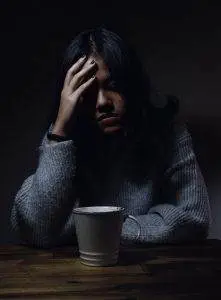
Celiac symptoms include:
- Fatigue
- Weight loss
- Diarrhea, pale colored stools, foul-smelling, fatty, greasy stool
- Abdominal bloating, bloated stomach, gas, stomach pain, abdominal pain
- Nausea, vomiting
- Constipation
- Headache, headaches, migraines, migraine headaches
- Skin rash, mouth ulcers, mouth sores, canker sores
- Neuropathy, numbness or tingling in hands and feet, problems with balance, joint pain
- Cognitive problems, foggy head, difficulty concentrating
Celiac can lead to SIBO, anemia, iron deficiency, loss of bone density (osteoporosis), weak bones, soft bones, bone loss (osteopenia), joint pain, or arthritis. People can also have liver problems, including fatty liver.
Dermatitis herpetiformis is a specific type of skin rash that causes itching and blisters to appear, primarily on the knees, elbows, torso, top of the head, and buttocks.
Women may find that celiac disease affects their hormones, menstrual periods, and can have an impact on fertility, even causing recurrent miscarriages.
Celiac disease can also contribute to infertility and low sperm count in men.
When a child develops celiac disease, the inability to absorb nutrients from food can cause problems with normal growth, such as short stature, delayed puberty, and damage to tooth enamel. Developmental disorders and behavioral issues can also be related to celiac, like ADD/ADHD and irritability.
In extreme cases, Celiac can cause seizures.
Celiac Disease Diagnosis and Treatment
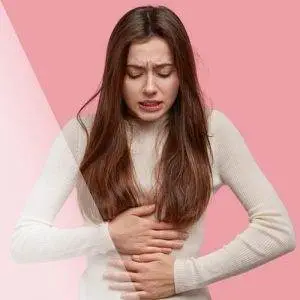
Going through the process of being diagnosed with Celiac disease or gluten intolerance is quite complicated and involves multiple tests. From the medical standpoint, it is best that you do not eliminate gluten or change your diet before the testing, so that it can accurately show how gluten is affecting your immune system and your intestines.
First, you will probably have a blood test that looks for certain antibodies that would indicate an autoimmune reaction to gluten. Some people may test negative for antibodies, and yet still have Celiac, though, so this blood testing is not enough to be conclusive. Genetic testing may be done, which looks for specific antigens to rule out Celiac. If testing shows that a person has antibodies, and they also have a specific type of skin rash (dermatitis herpetiformis), that is usually enough for a doctor to give an official diagnosis of Celiac disease.
Endoscopy is an imaging test which uses a little camera to see if there is damage to the intestinal lining. They will also take some tissue samples from the lining of the intestine to check for inflammation and damage. The results of these tests may lead to a formal Celiac diagnosis. People will often need to have an endoscopy to find out if they have Celiac disease, and then possibly repeated endoscopies to see if the inflammation is getting better or worse.
Sometimes people will try figuring out what is going on themselves with a food sensitivity test or food intolerance test kit that you can do at home and send in for results. Food allergy testing may give you some information as to whether you have a reaction to a specific allergen (egg allergy, milk allergy, peanut allergy, shellfish allergy) or have a food sensitivity, but they cannot tell you if you really have Celiac disease or gut inflammation.
Going through the diagnostic process for autoimmune diseases like Celiac disease can be exhausting in and of itself. Meanwhile, you aren’t yet getting treatment for your symptoms. The only treatment available in conventional medicine for Celiac disease really is to follow a gluten free diet. Most doctors are not able to do much beyond give you a list of foods you shouldn’t eat, or refer you to a dietitian.
TCM has the ability to provide more comprehensive care for people with Celiac disease, and many other autoimmune conditions. Acupuncturists are highly trained professionals when it comes to offering patients detailed guidance for following an effective Celiac disease diet.
Can Acupuncture Help Celiac Disease and Gluten Intolerance?

TCM has more to offer than just acupuncture treatment and herbal medicine. Nutrition is one of core competencies every TCM practitioner must master.
Acupuncture treatment can help relieve digestive symptoms like abdominal pain and bloating, and also have a positive impact on the system malfunctioning that leads to autoimmune reactions. With Chinese herbs, we are able to get very potent nutrients into the body that wouldn’t normally come from food. For people with Celiac, or other problems like food allergies or sensitivities, malnutrition due to malabsorption is a real problem.
A TCM nutrition approach can help restore the body’s health with foods and herbs better than a simple elimination diet for Celiac disease can. An acupuncturist listens carefully to the particular symptoms and sensations you describe. These provide important clues as to which organ systems are involved, and where yin and yang are out of balance. Then TCM provides a framework for tailoring the treatment and food plan for Celiac disease to each individual’s needs.
According to TCM theory, the stomach and spleen are responsible for digesting food. Celiac disease symptoms are, according to a typical TCM diagnosis, related to a spleen deficiency. When Qi in the spleen is weak, the body is not getting the nutrients it needs. Building up the strength of the spleen will often be the focus of the acupuncture portion of the treatment. Herbs and specific nourishing foods will be recommended, which will help anemia and soothe the digestive tract.
Acupuncture Near Me For Celiac Disease, West Los Angeles
Autoimmune diseases like Celiac disease can be especially frustrating because they seem to take over your whole life. Not only physical health, but mental health is compromised. Treatment options are limited. Fortunately, TCM offers a complementary form of medicine that is able to provide multi-faceted care for autoimmune disorders like Celiac, including: Crohn’s disease, Type 1 diabetes, hyperthyroidism, Lupus, rheumatoid arthritis, fibromyalgia, and multiple sclerosis (MS). Acupuncture treatment can help reduce feelings of anxiety and depression as you learn to manage your illness.
If you or someone you know has been suffering from digestive issues, and you suspect it may have something to do with gluten intolerance or Celiac disease, be prepared to go through testing, but also give some thought to adding a TCM provider to your health care team. At Art of Wellness, we have over 35 years of providing excellent care through TCM treatments, including expert nutrition services. It is like getting an acupuncturist and dietitian in one.
*This article is for education from the perspective of Traditional Chinese Medicine only. The education provided by this article is not approved by FDA to diagnose, prevent, treat and cure human diseases. It should not stop you from consulting with your physician for your medical conditions. Traditional Chinese Medicine is based on Qi, which is an invisible force that usually cannot be observed by modern science. Because science focuses on testing ideas about the natural world with evidence obtained through observation, these aspects of acupuncture can’t be studied by science. Therefore acupuncture and Chinese herbs are often not supported by double-blind, randomized trials, and they are considered alternative medicine therapies in the United States.
How to Treat Hepatitis With Acupuncture and TCM
Qineng Tan, L.Ac., Ph.D. & Xiaomei Cai, L.Ac., Ph.D.

Fever, fatigue, abdominal pain, jaundice, dark urine–these are possible signs of Hepatitis infection, although many people infected with Hepatitis show no symptoms. For some people, a Hepatitis B or Hepatitis C infection goes away on its own, but in other cases, it can cause serious liver damage, leading to chronic liver disease. Acupuncture and TCM treatment, including Chinese herbs, offer a way to help improve liver function and reduce symptoms of Hepatitis.
There are several variants of the Hepatitis virus that can cause inflammation of the liver, leading to scarring (liver cirrhosis or liver fibrosis), and in some cases leading to chronic liver problems or liver cancer. Hepatitis B (HBV) and Hep C (HCV) are the types of infection that can lead to long-term illness and even liver failure. It is estimated that over 300 million people worldwide are living with the effects of HBV or HCV infections.
There is a vaccination that offers protection against Hepatitis B and Hepatitis A, but there is no vaccine for Hepatitis types C, D, and E. People who have contracted Hepatitis A or an acute form of HBV are usually told to rest and drink lots of fluids. Medical treatment for chronic Hepatitis that lasts for more than six months usually involves antiviral medications that help slow down the spread of the virus through the body. TCM treatment for Hepatitis with acupuncture and herbs works to improve the function of the liver and related organs (spleen, kidneys, gallbladder) and to strengthen the immune system so that the body can overcome the effects of the Hepatitis virus.
What Causes Hepatitis?
There are currently five different types of Hepatitis infection, referred to as: Hepatitis A, Hepatitis B virus (HBV), Hepatitis C (HCV or Hep C), Hepatitis D, and Hepatitis E.
All of these viral infections affect the liver, causing inflammation and possibly scarring, known as cirrhosis of the liver or fibrosis of the liver.
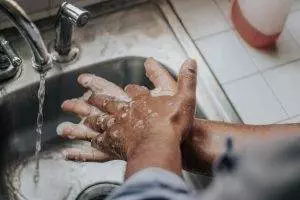
Hepatitis A and E viruses are carried in contaminated water or food supplies. People might contract the Hep A or Hep E virus through eating something like raw shellfish that was in contaminated water, or eating food prepared by a worker who did not wash their hands properly. These variants of Hepatitis may cause an acute infection, but do not lead to chronic conditions.
HBV and HCV are spread through bodily fluids like blood and semen, and can therefore be spread through sexual contact, or the sharing of needles, or a woman may pass the infection to her baby during birth. Hepatitis is a common co-infection in people living with HIV/AIDS. People with Cystic Fibrosis (CF) can also be more prone to infections and liver problems. These more serious forms of Hepatitis can lead to chronic illness, including cancer of the liver, or liver failure, making it one of the primary reasons people end up having a liver transplant.
Autoimmune hepatitis, which has also been called plasma cell hepatitis or lupoid hepatitis, occurs when the immune system mistakenly attacks liver cells.
Top 10 Symptoms of Hepatitis
Symptoms of a HBV or Hepatitis C infection often do not show up for a few weeks, a few months, or in some cases, years later. Some people, especially children, do not feel any symptoms of Hepatitis. The most common Hepatitis symptoms include:
- Abdominal pain, pain in right side
- Swelling in liver area, swollen belly (ascites – fluid buildup in the liver)
- Jaundice, yellow eyes, yellow skin
- Dark urine, pee is dark
- Light colored stools, poop is clay-colored
- Fatigue
- Nausea
- Fever
- Loss of appetite
- Joint pain
Bleeding easily or bruising easily are also potentially signs of Hep C, as is a skin rash, or itchy skin (pruritus), little blisters, or itchy patches of skin like psoriasis. Some people have a sensation of their internal organs itching.
What Is the Treatment for Hepatitis?
If a person shows high levels of liver enzymes and still has the Hepatitis B virus in their body after six months or more, they will often be prescribed medications aimed to slow the spread of the virus and prevent further damage to the liver. There are several types of antiviral medications used to treat patients with long-term effects of Hepatitis, some of them are pills (adefovir, entecavir, lamivudine, telbivudine, tenofovir) that are taken daily for a year, or for several years. Some, known as Interferons, are given as an injection a few times a week over the course of several months or more. These medications can slow the virus in some patients, but for some people, they may not do much to protect the body from liver damage or stop the virus from spreading. These medications can cause serious side effects, including headaches, dizziness, fever, and severe depression. Acupuncture and TCM methods offer an alternative or adjunct support to help promote better liver function and boost the body’s defense against the Hepatitis virus.
What Acupuncture and TCM Can Do for Hepatitis

Hepatitis infection is closely associated with the liver, as it is the liver that shows the most obvious damage as a result of infection, often resulting in cirrhosis or scarring of the liver. But according to TCM philosophy, the other internal organs work in concert with the liver, helping it to do the job of cleaning the blood and supplying it to the rest of the body. Patients with chronic Hepatitis B infection will demonstrate symptoms that help the acupuncture practitioner recognize a particular syndrome pattern, allowing them to use acupuncture points and Chinese herbs to work on deficiencies in the liver and other organs. In TCM theory, Hepatitis infection occurs due to pathogenic forces of toxic Heat and Dampness invading the body. The infection moves through different stages, and the TCM provider will tailor treatment with herbs, acupuncture, and moxibustion to the stage of infection and specific pattern of symptoms.
TCM differentiations of Hepatitis include:
- Liver Qi stagnation – causes symptoms like nausea, poor appetite, distension of the belly or bloated stomach
- Spleen and/or Kidney Yang deficiency – associated with poor appetite, loose stools, sallow complexion, weakness, loss of muscle
- Liver – Gallbladder Dampness and Heat – causes jaundice (yellowing of the eyes and skin), fever, nausea
- Liver – Kidney Yin Deficiency – indicated by headaches, dizziness, irregular periods, stiff joints, poor sleep, irritability, and ringing in the ears (tinnitus)
- Blood stasis – accumulation of blood in the liver contributes to fibrosis or cirrhosis, also causes pain in the lower rib area, menstrual problems, PMS, and depression.
A person may be more susceptible to getting Hepatitis because of some underlying deficiencies in their Qi, and/or the virus may cause those deficiencies to manifest. The main goal of acupuncture treatment for HBV or HCV, therefore, is to strengthen the liver, spleen, and kidneys, to clear any dampness or excess heat from these organs, and to increase the circulation of blood through the systems.
Traditional Chinese herb formulations have been shown in clinical trials to help improve liver function in patients with chronic Hepatitis B.
Herbs that help improve spleen function are believed to help rid the body of the virus and allow for healing of the liver.
Diet and nutrition are, naturally, also very important in helping to strengthen and detoxify the liver and other organs. Your TCM practitioner will go far beyond the usual advice (drink fluids, avoid alcohol), and will give you specific advice for a hepatitis diet plan.
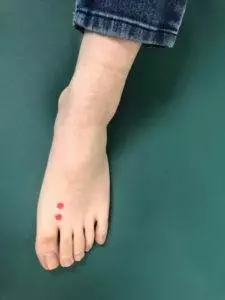
Acupuncture Near Me for Hepatitis in West LA
Chronic Hepatitis B and Hep C infections can be difficult to treat. Using acupuncture and herbs as an adjunct to conventional antiviral therapy for HBV may help to prevent further damage to the liver and improve organ function so that patients can recover from a chronic viral infection more fully. At Art of Wellness, we have over 30 years of experience providing integrative care for those suffering from chronic illnesses of all kinds.
*This article is for education from the perspective of Traditional Chinese Medicine only. The education provided by this article is not approved by FDA to diagnose, prevent, treat and cure human diseases. It should not stop you from consulting with your physician for your medical conditions. Traditional Chinese Medicine is based on Qi, which is an invisible force that usually cannot be observed by modern science. Because science focuses on testing ideas about the natural world with evidence obtained through observation, these aspects of acupuncture can’t be studied by science. Therefore acupuncture and Chinese herbs are often not supported by double-blind, randomized trials, and they are considered alternative medicine therapies in the United States.